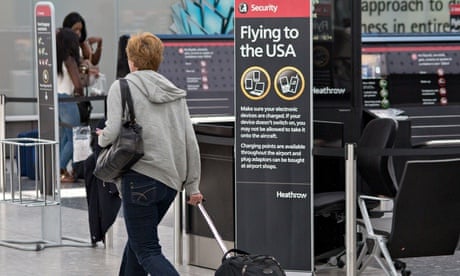Passengers flying to America from Britain could face strict searches and interrogations by Homeland Security staff at UK airports, after the British government showed an interest in entering into a "preclearance" agreement with the US.
Documents obtained by the Guardian show US authorities approached Britain and four other EU member states about setting up preclearance checks at European airports at two meetings of the European council's transatlantic relations working party (Cotra) in July.
According to the document – a German government response to a parliamentary question submitted by the Left party – Britain is the only country out of the five EU states to have expressly welcomed the proposal, stating that "Britain sees the advantages in allowing this procedure".
The Netherlands is said to be looking into the financial and legal feasibility of the proposals, while France has called for financial support from the US in exchange for a deal.
The document says: "Sweden's first reaction was to express scepticism, calling for further analysis of the consequences on the Schengen agreement [on open borders in Europe] and the European convention on human rights."
The German government said it was extremely cautious about such proposals.
The US has yet to submit an official request for a preclearance arrangement.
Left party German MP Andrej Hunko, who submitted the parliamentary question, said the negotiations were a reminder that the dystopian vision of a "transatlantic security space" involving an exchange of financial records, fingerprints and personal data, was already a reality.
"We cannot accept US authorities obtaining quasi-operative competences at European airports," Hunko said.
"After recent revelations on US espionage activity, this would send out the wrong signal. Instead, we should consider cancelling EU-US deals on data exchanges between police and secret services such as TFTP [Terrorist Finance Tracking Programme]."
Ireland is the only country in Europe that has preclearance checks for passengers flying to the US, covering Dublin and Shannon airports – an arrangement that has been in place since 2009. The two countries have had a pre-inspection agreement – allowing immigration inspections but not customs or agriculture inspections – in place since 1986.
Officially, preclearance is designed to reduce congestion at ports of entry. From a passenger point of view, one of the advantages is that it reduces the possibility of being denied entry to the US at the end of a long-haul flight.
But added checks at the European end would come at considerable financial cost to airport operators, and limit the flexibility with which airports can assign departure gates.
Some critics allege that the measure is intended to stop asylum seekers from landing on US soil where they can claim protection via the refugee convention.
Saira Grant, policy director of the Joint Council for the Welfare of Immigrants, described pre-departure clearance checks on British soil as "totally unnecessary". She said: "They would be costly and would further infringe on the civil and personal liberty of law-abiding innocent travellers to the US."
The Department of Homeland Security already has staff working at several European airports who issue "advice" on which passengers should not be allowed to travel to the US. Since flights carrying these passengers could be prevented from landing in the US, their recommendations are usually followed up. In 2011, for example, 1,300 people were stopped from travelling to the US in this way.
Since December 2011, an agreement between the US and EU on the transfer of passenger data allows Homeland Security and US border authorities to exchange and retain for up to 15 years information such as travel itineraries, passenger addresses and payment methods – a deal that critics say violates basic European principles. The Home Office said: "Pre-clearance, which is already in operation in Ireland, is a means of speeding the entry of passengers through US airports. Pre-clearance checks are entirely separate from aviation security screening. The government has not received any request from a UK airport to introduce such measures."

Comments (…)
Sign in or create your Guardian account to join the discussion